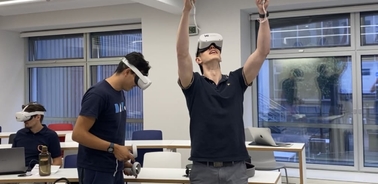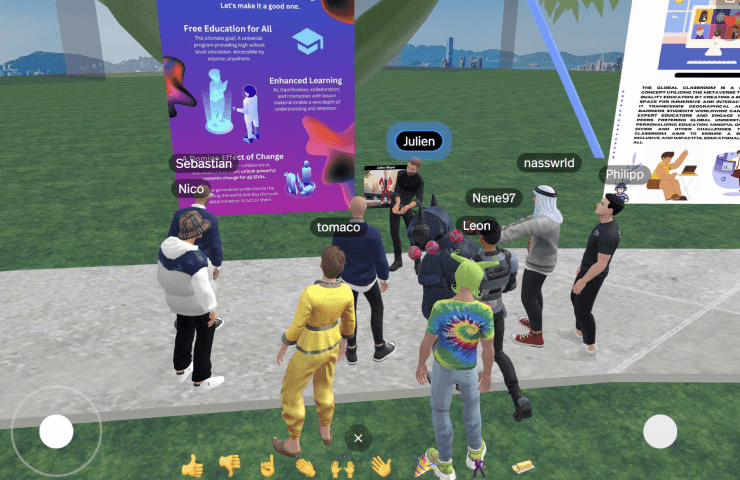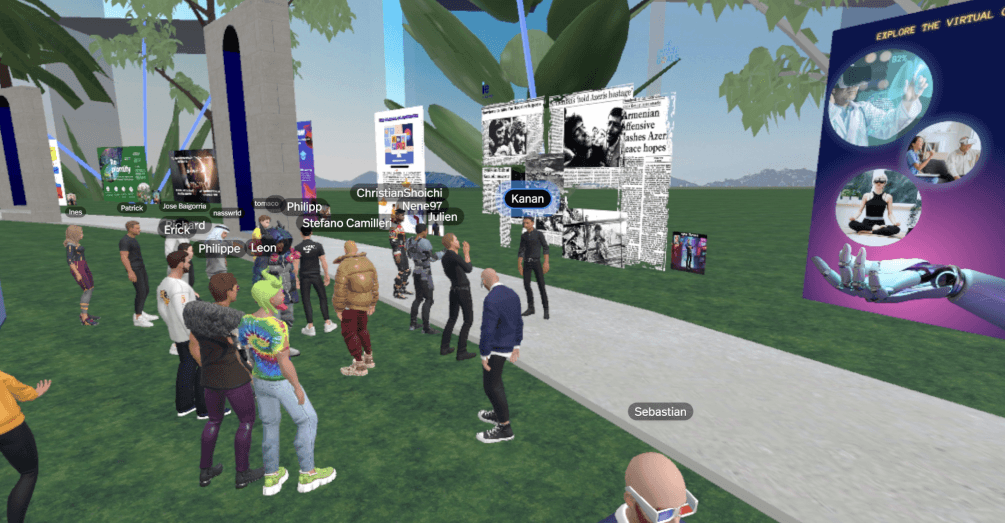The UN Challenge: IE Sci-Tech Students Transform Sustainable Development Goals Through Innovation

Students created a virtual gallery in the metaverse with their innovative solutions to support the SDGs.
Students of the Master in Digital Business & Innovation and the Master in Business Analytics and Big Data recently unveiled their innovative solutions for a sustainable future as part of the elective course Metaverse, VR & AR. The students identified key sustainability challenges and shared their 51 proposals aligned with the United Nations Sustainable Development Goals (SDGs), in a virtual gallery in the metaverse on Spatial.
“The exhibition provides the opportunity to explore a virtual gallery, where our students showcase their ideas and solutions to sustainable development challenges using the metaverse,” explained Sebastian Veldman, Metaverse VR & AR professor at IE.
Visitors are able to interact with the students, ask questions, and provide feedback on their project.
“This is a great opportunity to learn about the potential of the metaverse for sustainable development and to engage with a community of innovators and change-makers,” Veldman said.
Veldman assesses the feasibility and potential impact of each idea, ensuring the viability of the proposed solutions.
Here is a closer look at 10 of the top students projects:
1. “PeaceWalk in the Metaverse: A Digital Leap Towards Empathy and Global Unity Amidst the Ukrainian Crisis” by Viktoriia Korytska
The idea explores the potential of the Metaverse in addressing SDG 16 (Peace, Justice, and Strong Institutions) in the context of the ongoing war in Ukraine. The student discusses the concept of the Metaverse, its capabilities in fostering empathy and understanding, and proposes several Metaverse projects and applications to promote peace, improve governance, and support individuals affected by the conflict. It highlights the benefits, challenges, and potential impact of leveraging immersive technologies to drive social change and contribute to sustainable development goals.
2. “GreenSea: Metaverse Sustainability” by Darcy Arzate
The idea discusses the GreenSea initiative, which aims to rehabilitate the planet through the use of innovative technologies and the Metaverse. The paper highlights the environmental challenges faced by humanity, such as deforestation and climate change, and proposes leveraging the Metaverse to bridge the gap between people and nature. By visualising the impact of investments and allowing users to explore rehabilitation projects, the GreenSea initiative encourages increased investment, understanding, and reconnection with nature. The United Nations is suggested to play a vital role in supporting and promoting this initiative.
3. “Building a more inclusive Future - Combating discrimination and promoting inclusion through the metaverse” by Agustina Ruiz
The idea discusses the potential of the metaverse on reducing inequalities (SDG 10). She proposes the development of an inclusive and accessible virtual world for people with disabilities to promote social inclusion and provide equal opportunities. The idea highlights the benefits and drawbacks of utilising the metaverse for this purpose, the idea aims to create a more equitable and inclusive society by breaking down physical barriers and fostering cooperation and understanding among diverse communities.
4. “Car-to-Grid Technology for Sustainable Smart Cities in the Metaverse” by Leon Benz
This idea explores the use of AR and VR technologies in visualising and experiencing Car-to-Grid (C2G) technology within the context of sustainable smart cities. The student highlights the potential of C2G technology in achieving SDG 11 (Sustainable Cities and Communities) and proposes the Metaverse as a platform to create interactive models of smart cities with functioning C2G systems. The aim is to enhance understanding, acceptance, and adoption of C2G technology, ultimately contributing to sustainable urban development and the fight against climate change.
5. “Manufacturing Mirrors: Bridging the Gap for Women in the Metaverse” by Silvia Goyes
The idea proposes the establishment of a metaverse digital academy to train women from underdeveloped countries in manufacturing and engineering skills using digital twin technology. By leveraging the immersive and collaborative nature of the metaverse, the academy aims to empower women, promote gender equality, and reduce inequality within and among countries. The initiative utilizes ESI Group's IC.IDO Weave platform and seeks collaboration with the World Economic Forum's Global Collaboration Village to create a supportive and inclusive learning community in the metaverse.
6. “Reimagining Economic Growth in the Metaverse: The Global Virtual Skill Exchange (GVSE)” by Arya Khanna
The idea proposes the Global Virtual Skill Exchange (GVSE) as a solution within the Metaverse to address the challenges of achieving Sustainable Development Goal (SDG) 8: promoting sustained, inclusive, and sustainable economic growth, full and productive employment, and decent work for all. The GVSE leverages the immersive and interactive capabilities of the Metaverse to democratise access to education, skills training, employment opportunities, and entrepreneurship. The feasibility analysis highlights existing technologies like virtual reality, augmented reality, and artificial intelligence that can enable the GVSE. The paper also discusses the potential benefits, drawbacks, and mitigation strategies for the GVSE, emphasising the need to address the digital divide and regulatory considerations. The conclusion emphasizes the transformative potential of the GVSE in creating an inclusive and sustainable global economy.
7. “Replantify - A Metaverse ecosystem where users build and manage their own forests” by Julia Pereira
The paper discusses the concept of Replantify, a proposed project in the metaverse aimed at promoting reforestation and biodiversity conservation. It suggests creating a virtual ecosystem where users can build and manage their own forests, contribute to reforestation projects through the purchase of NFTs, and track the impact of their contributions. The project aligns with Sustainable Development Goals (SDGs) 13, 15, and 17, which focus on climate action, protecting biodiversity, and partnerships for sustainable development. The decentralised platform Decentraland is suggested as the ideal platform to implement Replantify. The paper also addresses potential risks and highlights the importance of taking concrete action in the real world to address deforestation.
8. “EarthBites: Sustainable Meat and Climate Impact Awareness” by Anabelle Kipfer
The idea introduces EarthBites, a metaverse concept aimed at promoting sustainable meat consumption and addressing climate change. It focuses on achieving Sustainable Development Goals (SDGs) 2, 12, and 13 related to zero hunger, responsible consumption and production, and climate action. EarthBites features educational exhibits, alternatives to meat, cooking recipes, seminars, technology showcases, and a sustainable agriculture investment hub. It aims to raise awareness, educate users, and facilitate collaborations to support a more sustainable food system. However, challenges such as accessibility, technological limitations, and tracking impact need to be addressed.
9. “De-Litter-Earth - An interactive educational game in the metaverse” by Christian Sho-ichi Strahm
The idea discusses the "De-Litter Earth" interactive educational game project set in the metaverse. The game aims to raise awareness about environmental issues, particularly litter's impact on marine and terrestrial ecosystems. It aligns with the UN Sustainable Development Goals of Life Below Water and Life On Land. The game offers immersive gameplay, educational content, and collaborations with NGOs and sponsors to promote environmental awareness and conservation.
10. “Harnessing the Power of the Metaverse to Address Mental Health and Well-being” by Allesandro Ratti
The paper explores the potential of utilising the Metaverse to address the global mental health crisis. It discusses existing efforts in using virtual reality therapy and virtual support groups for mental health treatment. The paper proposes virtual health clinics, immersive health and wellness programs, and health data visualisation and gamification as solutions within the Metaverse. Feasibility and potential impact are also discussed, highlighting accessibility, cost-effectiveness, and user engagement as key advantages. The paper emphasises the importance of leveraging the Metaverse to achieve Sustainable Development Goal 3 of promoting mental health and well-being for all.

